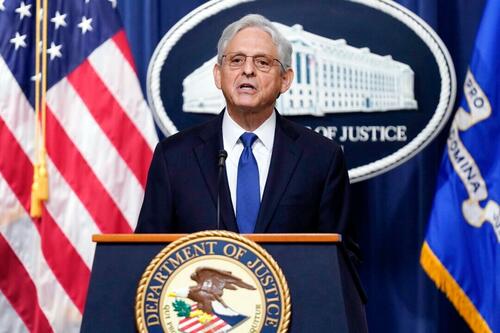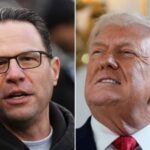
Authored by Zachary Stieber via The Epoch Times (emphasis ours),
U.S. prosecutors have started dropping obstruction charges against defendants alleged to have been involved in the Jan. 6, 2021, breach of the U.S. Capitol, in the wake of a crucial Supreme Court decision.

Government prosecutors informed defendants and the judge overseeing the defendants’ cases that it will drop charges brought under federal law Section 1512(c)(2) in light of the ruling from the nation’s top court, according to a July 15 filing.
“This decision was made in order to avoid disruption to the trial schedule for a five-defendant case, and the dismissal eliminates the need for additional litigation as to the sufficiency of the Section 1512 charge as applied to these defendants,” the prosecutors told the judge.
Prosecutors in a separate Jan. 6 case said on July 11 that they were dropping the same obstruction charge against defendant Mark Sahady after the judge ordered the government to participate in a briefing on the effects of the Supreme Court decision on his case and rejected a motion from the government for more time to assess the ruling’s impact.
“Given the length of time this case has been pending, the specific facts of this case, the other relevant charges, the current trial date, and the need to promote judicial economy and efficiency, the United States requests that Count One be dismissed without prejudice in the interests of justice and that trial proceed on the remaining counts on August 12, 2024,” prosecutors said.
Defendants in other cases, and multiple people who have been convicted and are awaiting sentencing, have asked judges to consider the effect of the ruling. Some of the judges have ordered prosecutors to file briefs presenting their positions on what impact the ruling has on charges against the defendants.
Prosecutors in at least one case have resisted dropping an obstruction charge brought under Section 1512, saying the ruling doesn’t bar them from applying the charge to the Jan. 6 defendants.
The majority of Supreme Court justices said in the ruling, released June 28, that federal prosecutors went overboard in their application of Section 1512, which was approved by Congress in the aftermath of the Enron scandal and bars altering, destroying, mutilating, or concealing records.
The law also says that a person who “otherwise obstructs, influences, or impedes any official proceeding or attempts to do so, shall be fined under this title or imprisoned not more than 20 years, or both.”
Prosecutors said that the latter part of the law cover various crimes carried out by Jan. 6 defendants, a view rejected by the court’s majority.
“It would be peculiar to conclude that in closing the Enron gap, Congress actually hid away in the second part of the third subsection of Section 1512 a catchall provision that reaches far beyond the document shredding and similar scenarios that prompted the legislation in the first place,” Chief Justice John Roberts wrote.
Proving a violation of the law requires prosecutors to show that a defendant impaired or attempted to impair the availability of records or documents used in an official proceeding, according to the ruling, which was made in favor of defendant Joseph Fischer.
Justices vacated an opinion from the federal appeals court in Washington that had ruled in favor of the government and returned the case to the court for proceedings consistent with the new ruling.
Some 1,472 people have been charged in relation to the Capitol breach. Of the 259 defendants charged under Section 1512, 133 have already been convicted and sentenced. All of those individuals were charged with at least one other crime.
Attorney General Merrick Garland said after the Supreme Court decision was handed down that he was disappointed because it “limits an important federal statute.”
He added that the Department of Justice “will take appropriate steps to comply with the court’s ruling.”
Authored by Zachary Stieber via The Epoch Times (emphasis ours),
U.S. prosecutors have started dropping obstruction charges against defendants alleged to have been involved in the Jan. 6, 2021, breach of the U.S. Capitol, in the wake of a crucial Supreme Court decision.

Government prosecutors informed defendants and the judge overseeing the defendants’ cases that it will drop charges brought under federal law Section 1512(c)(2) in light of the ruling from the nation’s top court, according to a July 15 filing.
“This decision was made in order to avoid disruption to the trial schedule for a five-defendant case, and the dismissal eliminates the need for additional litigation as to the sufficiency of the Section 1512 charge as applied to these defendants,” the prosecutors told the judge.
Prosecutors in a separate Jan. 6 case said on July 11 that they were dropping the same obstruction charge against defendant Mark Sahady after the judge ordered the government to participate in a briefing on the effects of the Supreme Court decision on his case and rejected a motion from the government for more time to assess the ruling’s impact.
“Given the length of time this case has been pending, the specific facts of this case, the other relevant charges, the current trial date, and the need to promote judicial economy and efficiency, the United States requests that Count One be dismissed without prejudice in the interests of justice and that trial proceed on the remaining counts on August 12, 2024,” prosecutors said.
Defendants in other cases, and multiple people who have been convicted and are awaiting sentencing, have asked judges to consider the effect of the ruling. Some of the judges have ordered prosecutors to file briefs presenting their positions on what impact the ruling has on charges against the defendants.
Prosecutors in at least one case have resisted dropping an obstruction charge brought under Section 1512, saying the ruling doesn’t bar them from applying the charge to the Jan. 6 defendants.
The majority of Supreme Court justices said in the ruling, released June 28, that federal prosecutors went overboard in their application of Section 1512, which was approved by Congress in the aftermath of the Enron scandal and bars altering, destroying, mutilating, or concealing records.
The law also says that a person who “otherwise obstructs, influences, or impedes any official proceeding or attempts to do so, shall be fined under this title or imprisoned not more than 20 years, or both.”
Prosecutors said that the latter part of the law cover various crimes carried out by Jan. 6 defendants, a view rejected by the court’s majority.
“It would be peculiar to conclude that in closing the Enron gap, Congress actually hid away in the second part of the third subsection of Section 1512 a catchall provision that reaches far beyond the document shredding and similar scenarios that prompted the legislation in the first place,” Chief Justice John Roberts wrote.
Proving a violation of the law requires prosecutors to show that a defendant impaired or attempted to impair the availability of records or documents used in an official proceeding, according to the ruling, which was made in favor of defendant Joseph Fischer.
Justices vacated an opinion from the federal appeals court in Washington that had ruled in favor of the government and returned the case to the court for proceedings consistent with the new ruling.
Some 1,472 people have been charged in relation to the Capitol breach. Of the 259 defendants charged under Section 1512, 133 have already been convicted and sentenced. All of those individuals were charged with at least one other crime.
Attorney General Merrick Garland said after the Supreme Court decision was handed down that he was disappointed because it “limits an important federal statute.”
He added that the Department of Justice “will take appropriate steps to comply with the court’s ruling.”
Loading…




